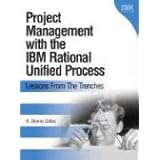
Average Reviews:

(More customer reviews)Talk about reading a book that feels like you're reliving your current work assignment...Project Management with the IBM Rational Unified Process - Lessons from the Trenches by R. Dennis Gibbs.
Contents: Introduction to Outsourcing; Overview of the Rational Unified Process; Getting Started - Request for Proposals (RFPs), Proposals, and Contracts; Best Practices for Staffing the Outsourcing Organization's Project Management Office (PMO); Best Practices for Staffing the Contractor's Software Project Team; Establishing the Software Development Environment; Inception - Kicking Off the Project; Identifying and Managing Risks; Navigating the Requirements Management Process; Construction Iterations - Staying on Target; Testing; Transitioning a System into Service; System Operations and Maintenance Issues; Using Consultants Effectively; The Project Postmortem; Common Mistakes Utilizing RUP; Implementing a Two-Stage Procurement Process; Glossary; Bibliography; Index
I'm in the midst of a specification documentation project, and the organization I work for uses the Rational Unified Process (RUP) standard.The author rightfully states that RUP is adaptable, in that you don't have to adopt absolutely every artifact that RUP contains.You tailor it to fit the organization and the process load you want to undertake.This book is far from a comprehensive guide to everything RUP.Instead, it's more focused on solid project management techniques and processes, and it so happens that RUP is the underlying documentation flow that's used.The other twist you'll see here is that there's an emphasis that you've brought in contractors or you've outsourced your development activity, and Gibbs focuses on how a RUP approach can help overcome many of the difficulties inherent in not controlling every aspect of software development.
There's a couple of things I don't quite agree with, however...The author talks about RUP being used in an agile methodology, and states that RUP *can* be agile if you use only what you need.Technically that is probably true, but in reality RUP is a document-heavy methodology that bears little resemblance to agile techniques as they are commonly thought of.Also, chapter 6, Establishing the Software Development Environment, talks about the build/borrow/buy choice for development software.He refers to the "borrow" solution as shareware, when in reality it's open source software.They are two different things, and it makes me wonder how much the guy really knows about software as opposed to project management.
If you're in the right scenario of managing outsourced projects using a RUP methodology, this book will offer significant insight.I don't know that I'd recommend it for an introduction to RUP, as you'll probably walk away with a few more questions than answers...
Click Here to see more reviews about: Project Management with the IBM(R) Rational Unified Process(R): Lessons From The Trenches
Product Description:
· Master win–win techniques for managing outsourced and offshore projects, from procurement and risk mitigation to maintenance
· Use RUP to implement best-practice project management throughout the software development lifecycle
· Overcome key management challenges, from changing requirements to managing user expectations
The Hands-On, Start-to-Finish Guide to Managing Software Projects with the IBM® Rational Unified Process®
This is the definitive guide to managing software development projects with the IBM Rational Unified Process (RUP®). Drawing on his extensive experience managing projects with the RUP, R. Dennis Gibbs covers the entire development lifecycle, from planning and requirements to post-mortems and system maintenance. Gibbs offers especially valuable insights into using the RUP to manage outsourced projects and any project relying on distributed development teams-outsourced, insourced, or both.
This "from the trenches" guidebook is invaluable for anyone interested in best practices for managing software development: project managers, team leaders, procurement and contracting specialists, quality assurance and software process professionals, consultants, and developers. If you're already using the RUP, Gibbs will help you more effectively use it. Whatever your role or the RUP experience, you'll learn ways to
· Simplify and streamline the management of any large-scale or outsourced project
· Overcome the challenges of using the RUP in software project management
· Optimize software procurement and supplier relationships, from Request for Proposals (RFPs) and contracts to delivery
· Staff high-performance project teams and project management offices
· Establish productive, consistent development environments
· Run effective project kickoffs
· Systematically identify and mitigate project risks
· Manage the technical and business challenges of changing requirements
· Organize iterations and testing in incremental development processes
· Transition new systems into service: from managing expectations to migrating data
· Plan system maintenance and implement effective change control
· Learn all you can from project post-mortems-and put those lessons into practice
Want to read more honest consumer review about Project Management with the IBM(R) Rational Unified Process(R): Lessons From The Trenches now ?

0 comments:
Post a Comment